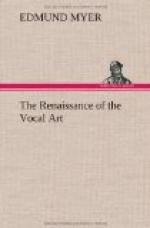In this age of progress and knowledge of laws and facts, the new school, under the influence of Nature’s laws and common sense, with the aid of flexible movements and vitalized energy, must do as much for the development of the singing voice in three or four years as the old school was able to do in eight or ten. This is necessary, both because the singing world demands it, and Nature and common sense teach us that it does not take years and years of hard study and practice simply to develop the voice. From a strictly musical standpoint, however, it does take years to ripen a great singer, to make a great artist. Many voices are ruined musically by years of hard, muscular practice. Hence we say the new school must give the voice freedom, and remove all muscular restraint by or through natural, common-sense, vitalized movements.
ARTICLE SIX.
Conditions.
Nature’s laws are God’s laws. All nature, the universe itself, is an expression of God’s thoughts or desires in accordance with His laws. This one controlling force, this principle of law, is at the bottom of everything in nature and art. Everything which man says or does under normal, free conditions, is self-expression, an expression of his inner nature; but this expression must be under the law. If not, the expression is unnatural and therefore artificial. This principle, which holds true in all of man’s expression, in all art, is in nothing more evident than in the use of the singing voice.
“Nature does nothing for man except what she enables him to do for himself.” Nature gives him much, but never compels him to use what she gives. Man is a free agent. He can obey or violate the laws of Nature at will; but he cannot violate Nature’s laws, and not pay the penalty. This thought or principle constantly stands out as a warning to the vocal world. The student of the voice who violates Nature’s laws must not expect to escape the penalty, which is hard, harsh, unmusical tone or ruined voice. Nature demands certain conditions in order to produce beautiful, artistic tone. If the student of the voice desires to develop beautiful, artistic tone he is compelled to study the conditions, the fundamental principles under the law; and this can be done only by the use of common-sense methods.
All artistic tone is the result of certain conditions, conditions demanded by Nature and not man’s ideas or fancies. These conditions are dependent upon form and adjustment, or we might better say adjustment and form, as form is the result of the adjustment of the parts. So far all writers on the voice, and all teachers, agree; but here comes the parting of the ways. One man attempts form and adjustment by locally influencing the parts,—the tongue, the lips, the soft palate, the larynx, etc. This results in muscular singing and artificiality. We have found that form and adjustment, to be right, must be automatic. This condition cannot be secured by any system of direct local effort, but must be the result of flexible, vitalized bodily movements—movements which arouse and develop all the true conditions of tone; movements which allow the voice to sing spontaneously.




